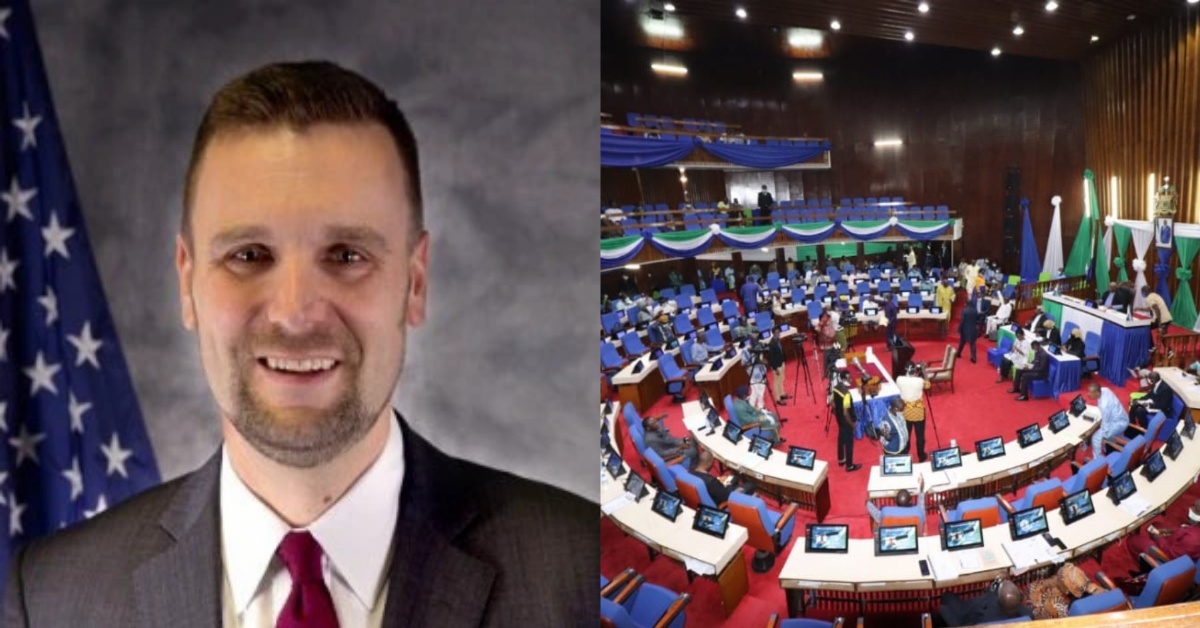A delegation from the Millennium Challenge Corporation (MCC) has on Thursday 3 November 2022 engaged and updated Parliamentarians on progress made so far on the Sierra Leone Compact development process and reaffirmed the MCC’s commitment to working with the people of Sierra Leone.
The meeting which took place at the Speaker”s Board Room, Parliament Building at Tower Hill in Freetown brought together Parliamentarians from all political parties that were present in Parliament.
The Director General of the Parliament of Sierra Leone, Madam Finder Frazer received the MCC team on behalf of the Leadership of Parliament. She welcomed them to Parliament and wished them a fruitful deliberations.
Explaining the purpose of their visit, the Managing Director, Department of Compact Operations, Africa Programs, Jason A. Small (photo) said MCC has a very valuable role to play in Sierra Leone. He reiterated that MCC is for the people of Sierra Leone and went on to say, they intend to bring economic growth and development through the implementation of the compact program.
He assured and expressed hope for MPs’ participation in the signing of the Compact next year.
He informed that, they need the support of all stakeholders to ensure that the compact becomes a reality. He informed that, it would engender a lot of developments across communities, relative to sustainable energy, agriculture, and infrastructure amongst other benefits.” We want to use today as an opportunity to answer any questions” he disclosed to MPs. He acknowledged the country’s global economic challenges and expressed hope for continued democratic governance amidst the forthcoming elections.
On his part, the Managing Director, Development of Policy and Evaluation Selection, Policy and Performance, Dan Barnes spoke about the importance of the MCC scorecards. He disclosed the relevance of the MCC indicators and related opportunities and criteria for MCC on the same. He informed that, inclusive participation and democratic good governance are critical to achieving the MCC Compact.
Hon Sallieu O. Sesay expressed concerns over the conduct of credible elections and also the MCC’s intervention in ensuring free, fair, and transparent elections.
Hon. Dr. Mark Mahmoud Kaloko raised concern about the parameters used by MCC for rating, democratic governance, natural resource indicators, growths, types and evenly distribution of the package, in light of cascading down to beneficiaries.
Hon. Alex Rogers called on the MCC to promote energy within rural communities.
Hon. Muniru Lansana feared that the implementation benefits would not be squandered by external experts.
Hon. Abdul Kargbo suggested to the MCC to consider equal opportunities for rural communities just like the urban areas. He suggested to the team to do continuous monitoring around MCC indicators.
Hon Brima Mansaray suggested to MCC to monitor the implementation of the project not to miss the timeframe.
Hon Lahai Marrah spoke about the relevance of accessibility especially in remote communities, pointing out Falaba as one of the backward districts. He also spoke about managing the indicators well and job creation during the course.
Hon Sulaiman Marray-Conteh commended the MCC for supporting the threshold water facility projects in King Tom and Aberdeen. The MP mentioned the passage of the two land bills which will impact the scorecard in the area of land rights and access. He highlighted the relevance of the priority areas. He expressed hope for stakeholders’ collaboration and national exclusivity geared towards the implementation for huge beneficiation.
Hon Dr. Roland Kargbo expressed a worrying change in the country’s indicators and accessibility to Karena district which has been lagging behind in development.
Hon. Hindolo T. Sandi spoke about infrastructural development and called on the MCC team to address the road networks in Freetown.
Whip of Opposition, Hon Hassan Sesay, highlighted the Compact priorities and went on to suggest a platform that would engender strong policies. The Opposition MP maintained that, promoting political participation, accessibility to the market, tackle economic challenges and managing citizens’ livelihood would enhance good governance.
He insisted that issues that predicate on governance should be addressed from a nationalistic point. “Good governance cannot exist without the rights of the people”, he stated and went on to say, “We cannot have scorecards to the disadvantages of another group”.
Credit: Parliament of Sierra Leone



 Post a comment
Post a comment









Comment(s)
Disclaimer: Comments expressed here do not reflect the opinions of Sierraloaded or any employee thereof.
Be the first to comment